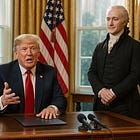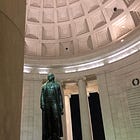The Spectacular Vindication of the Anti-Federalists
Nearly a quarter millennium after the Constitution's signing, the faction's warnings are more relevant than ever.
Patrick Henry was too sharp to be soothed by the Federalists’ assurances. The Constitution, signed on September 17, 1787, he feared, would not merely strengthen the union but consolidate it, turning the states into appendages of a distant authority. Madison and others could hardly be faulted for thinking stronger central power was necessary; the Articles had collapsed under debt, rebellion, and foreign peril. Yet their insistence that the states would remain effective checks on the federal government never came to be. In Virginia’s political skirmishes, Henry had already clashed with Madison and Jefferson, the latter once confessing in frustration that he “devoutly” hoped for Henry’s death. So when invited to the Philadelphia Convention, Henry declined with a phrase that made him immortal: “I smell a rat.”
Henry became one of several Anti-Federalists to scrutinize and oppose the directional leanings of the Constitution toward centralized power, going on to pseudonymously write several of the Anti-Federalist Papers, a collection of competing essays outlining all the ways Federalists were laying the groundwork for a single executive, an unchecked judiciary, and a system more broadly that would undermine subnational institutions and the people’s check on power. Otherwise sidelined, Henry and company did manage to successfully lobby for the addition of an explicit Bill of Rights, which, at first, only applied between citizens and the federal government, but would later, through an emboldened Supreme Court, come to apply between citizens and state governments. Most of the first ten amendments have held up much better than the Ninth and Tenth Amendments, scraps thrown at the feet of Anti-Federalists by the Federalists, that clearly failed to limit the usurpations of power from the people and the states by the federal government.
Pivotal as the addition of the Bill of Rights was—and as hard as it is to imagine the United States surviving without them, particularly under the current administration—where the Anti-Federalists demonstrated their greatest prescience was around the presidency, the judiciary, and clauses including the Commerce Clause and Necessary and Proper Clause, which gradually consolidated an amount of power that can be traced to our toxically existential modern politics. They correctly foresaw the untested idea that a single executive would erode state sovereignty and local self-rule, something that manifested only seven years after signing of the Constitution during the Whiskey Rebellion. They predicted a federal judiciary that would stretch its own powers, something that materialized only 16 years later with the Marbury v. Madison decision. The Anti-Federalists warned of a central government that would use money as leverage over the states, which accelerated during the Progressive Era and is now a fixture of policymaking that transcends ideology and party.
For this foresight and much more, the Anti-Federalists were treated as cranks. They lost the ratification battle, and then they lost the history books, remembered mostly as sore losers to the poetically flawed brilliance of the Founders. Two centuries later, the vindication of the Anti-Federalists in most respects is inarguable. The United States looks far more like the consolidation they dreaded than the balanced federalism they were assured would be secured by their Federalist counterparts.
On the positive side, the framers deliberately set up a federal system that preserved state sovereignty, separated powers to check consolidation, and barred hereditary rule, while also anchoring at least one chamber of Congress in direct accountability to the people. Unintentionally, the system also allowed space for democratic expansion, as suffrage broadened beyond the narrow electorate of 1787 and states exercised their reserved powers to pioneer their own constitutions and policy experiments. But there were intended features that proved corrosive to decentralization: a stronger executive than many republicans of the time thought safe, a standing army provision always waiting to be activated, and vague clauses that invited consolidation. Unintended consequences were even more dramatic: judicial review, nationalized parties, and an imperial presidency.
The Anti-Federalists saw the presidency for what it could become: an elective monarchy. In Cato V, Cato, thought to be George Clinton of New York, the warning is blunt—once vested with military command and appointments, the president would grow beyond accountability and “degenerate into a monarchy.” Brutus No. 1, thought to be Robert Yates of New York, echoed the same concern, pointing to vague constitutional language that left the executive’s scope undefined. Federalists promised the separation of powers would check such ambitions, but experience suggests otherwise. From Lincoln’s wartime suspensions to FDR’s fourth term to modern presidents ruling by executive order and unilateral military action, the office has swelled far beyond what the framers described in Philadelphia. The Anti-Federalists didn’t imagine cable news or social media, but they understood personality-driven politics. Today, the presidency dominates not just law and policy but culture itself. The elective monarchy has arrived, and it was charted on Anti-Federalist maps.
The Anti-Federalists recognized the presidency as the hinge on which consolidation would swing. In Cato IV, the executive is described as vague in its construction and perilous in its design. He invokes Montesquieu and how great power must be checked by brevity, yet here was vast authority vested for four years, long enough to hatch designs of ambition. With command of the army and navy, control over appointments, the power to pardon even treason, and influence over treaties and legislation, the president would inevitably attract a train of courtiers. A court culture would bloom in the new capital, complete with flattery, intrigue, and idleness. Cato rightly asked, what makes this president essentially different from the king of Britain? Two centuries on, the pomp and reach of the American presidency suggest not a whole lot of divergence.
Brutus saw, earlier than most, the outsized power of the courts. In Brutus XI, he warns the new judiciary would be “totally independent, both of the people and the legislature… ‘No errors they may commit can be corrected by any power above them,’” and that judges could read the Constitution not only by its text but “according to the reasoning spirit of it,” letting their opinions “have the force of law.” That, he argues, would “operate… to a total subversion of the state judiciaries,” shrinking state power with every federal adjudication. In Brutus XV, the point hardens into a verdict: the justices would be “independent in the fullest sense of the word,” with “no power above them, to control any of their decisions.”
The Anti-Federalists saw clearly that consolidation would sap the vitality of the states. In Federal Farmer No. 3, the warning is that a distant Congress could never embody the people’s interests: “I have no idea that the interests, feelings, and opinions of three or four millions of people, especially touching internal taxation, can be collected in such a house.” Representation this thin, combined with the power to regulate elections, would inevitably empower a national elite at the expense of local self-rule. Centinel No. 1, thought to be Samuel Bryan of Philadelphia, sounded the alarm even more starkly: “All the blessings of liberty and the dearest privileges of freemen are now at stake,” for the supremacy and general welfare clauses would enable Congress to seize “every species of internal taxation” and enforce it with a standing army.
The Federalists countered with assurances: the Senate would defend state authority, and the states would retain all powers not explicitly delegated. Yet today, cooperative federalism has made states administrative arms of Washington, hamstrung by grants and mandates. National media and parties eroded state distinctiveness, creating one homogenized political culture.
For the Anti-Federalists, the most dangerous feature of the Constitution was not what it said, but what it left open. Brutus No. 1 zeroed in on the “necessary and proper” clause, warning it would allow Congress to stretch its authority without end: “This government is to possess absolute and uncontrollable power… so far as it extends to all the objects of which it has cognizance, it is supreme.” Such vagueness, he argued, guaranteed expansion. Brutus No. 6 pressed the point on taxation, noting that Article I, Section 8 left “no other limitation than the discretion of the Congress” and that, in practice, the states would not “have the power to raise one shilling in any way, but by the permission of the Congress.” History bore them out. The commerce clause has justified federal regulation of intrastate possession of goods in Wickard v. Filburn, civil rights, healthcare, and even criminal law. What Brutus foresaw—state governments reduced to fiscal dependents of the center—has largely come to pass.
The Anti-Federalists were not prophets without error, but their instincts often carried the ring of truth. At their best, they intended to secure state sovereignty, believing liberty was safest when political power remained close to the people. Their pressure produced the Bill of Rights, perhaps their greatest legacy, and their suspicion of “consolidation” injected a permanent caution against national aggrandizement. Yet some of what they intended was shortsighted: they underestimated the need for a functional central government to manage debt, diplomacy, and interstate order, and their parochialism left space for entrenched local injustices. Unintentionally, their writings gave later generations a powerful canon for resisting federal overreach and reminded us that the Constitution was not a sacred text but a political compromise. But they also left behind a vocabulary that would be twisted in defense of slavery, segregation, and nullification—ironically weakening the very cause of liberty they sought to defend.
If the United States is ever to reform itself toward a more genuinely democratic order, it would follow far more closely the instincts of the Anti-Federalists than the Federalists. A weaker presidency, stripped of its courtly aura and concentrated powers, would restore the executive to its proper place—if it ought to even exist at all. A narrower judiciary, limited in its jurisdiction and unable to dictate sweeping social policy from the bench, would place law closer to the people. Congress, meanwhile, would see its most elastic powers curtailed—its regulation of commerce bound to its original meaning, and its ability to condition funding on state compliance eliminated. These changes would affirm the primacy of the states, and by extension, the people.
A more perfect union would not mean uniformity, but encouraging pluralism—self-determination of a collective but dispersed scale that blurs the lines between small or big government. It would look like states experimenting with their own immigration policies, trade agreements, and social orders—subject always to the people. Elections would be reordered to disrupt the nationalization of political culture, with presidential contests isolated from congressional races. The weight set onto state partisans of having to toe the national party line would be lifted, and they could be given more latitude to pursue a wider suite of policies. Congress would be able to fire members of the president’s cabinet, and most executive orders and measures of any sort would require congressional approval. In this vision, the federal government’s role is neither architect nor overseer but facilitator: safeguarding voting rights, redistributing wealth via unconditional grants to ensure equity among states, and leaving much of the work of domestic governance to local self-rule.
A twenty-first-century Anti-Federalist constitution would not dissolve the union but redeem it. It would recognize that there is not, nor has there ever been, a single conception of American identity or interpretation of American values. It would recognize that crediting the dysfunction of the existing system to the dispersion of power is akin to a ravenous glutton who doesn’t know why their stomach aches. If we are to learn anything from the last quarter millennium, it should compel us to bend toward the distribution of power, and as a result, endless possibilities.








What the founding fathers also did not foresee was the granting of “citizenship” to corporations and special interest groups and the obscene amount of graft and corruption it injects into the already unstable old system.
Someone once remarked, “For such a young country, the U.S. has a very old Constitution.” We are long past due for a Constitutional Convention, but it will probably be proceeded by a massive disruption. It took the devastation of two World Wars to motivate Europe and Asia to modernize their political systems. How does the world’s largest economy reinvent itself in a globalized world without upsetting everyone’s apple carts?
I'm not sure it matter what the constitution says, when we have political parties that routinely ignore it.
Of what use is the tenth amendment, when the states are controlled by the same people who control Washington DC?
Laws and constitutions mean nothing. It is the people in control who decide everything. We are not a nation of laws, we are a nation of men. And those who are in control are entirely democrats and republicans. Remember, even combined, they are NOT a majority. But they have control.